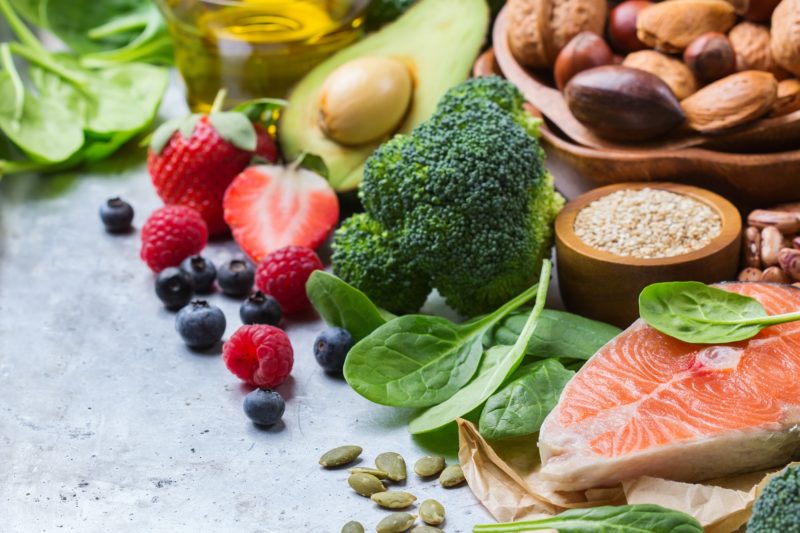A healthy diet and exercise are the two things most commonly considered as drivers of health and for good reason. Human beings were built to be active and regular physical activity can be the difference between aging gracefully and rapid decline.
As the body’s primary fuel source, the foods we eat play an important part in the way our bodies and our minds perform.
What you eat can shape your cognitive health now and as you age, so it’s vital that you respect the importance of what you eat as well as when you eat it. Foods rich in antioxidants, omega 3 fatty acids and B vitamins are well known to support brain health, but perhaps the most important thing is to stick to a consistent diet that contains the right foods.
Your brain is a powerful organ and one that burns a lot of energy. In fact, around 20% of the calories the average person burns each day are burned as a result of brain activity. Therefore, the source of calories that it burns are of extreme importance as our biochemical reaction to food sources differs depending on what it is.
With this in mind, we give you 11 foods that will support healthy aging, strong cognitive function and prevent cognitive decline.
1. Fatty Fish
Fish are fantastic resources for omega-3 fatty acids and healthy fats. These unsaturated fats are important as they lower blood levels of beta amyloid, a protein that is also the main ingredient in the plaques found in the brains of Alzheimer’s patients. Studies suggests that omega-3s also increase the blood flow to the brain and help cell membranes form, thus improving the structure of brain cells. This can drive improved brain function, boosting memory and stabilizing moods along the way.
2. Nuts
An important part of any diet, nuts are filled with mono and polyunsaturated fats. They can lower cholesterol and relax blood vessels to support heart health, but there also an important source of antioxidants, healthy fat and vitamin E, which helps protect cell membranes from free radical damage. Some nuts are also high in omega-3s. A study in the American Journal of Clinical Nutrition notes that regular nut consumption could possibly be used as an adjunctive therapeutic strategy in the treatment and prevention of several neurodegenerative diseases and age-related brain dysfunction.
3. Whole Grains
The glucose levels in our blood play an important role in our health and can have an impact on the brain and the development of Alzheimer’s disease. Whole grains help prevent blood glucose levels rising and thus, reduce the risk of type 2 diabetes. They also contain a high volume of B vitamins which reduce inflammation in the brain and may help preserve memory function. When it comes to whole grains, foods such as oats, quinoa, buckwheat, barley, corn and brown and wild rice are all healthy options.
4. Berries
Have you ever looked at the beautiful color of berries and thought they looked like a health food on site? Well, you were right. Flavanoids are plant pigments that give berries their color, but they also pack antioxidants that reduce oxidative stress and inflammation throughout the body. It can also help boost plasticity that can form new connections that aide in memory and learning activities and as a result, can help prevent or delay the advancement of memory loss and neurodegenerative diseases.
5. Tea and Coffee
While caffeine certainly has its drawbacks, it does boost mental functioning. It’s a good source of antioxidants and, according to a recent study, may support the brain’s ability to process information beyond simply being a concentration aid. Another study published in the journal Practical Neurology suggests that coffee consumption throughout life can reduce the risk of experiencing cognitive decline, Parkinson’s disease, Alzheimer’s and stroke. In the case of tea, health benefits go beyond the caffeine as it possesses L-theanine. An amino acid found in plant and fungal species, it can increase the activity of the neurotransmitter GABA, which helps reduce anxiety and makes you feel more relaxed without being tired.
6. Seeds
Boasting a large number of antioxidants, vitamins and nutrients, seeds are an important part of a healthy diet. Pumpkin seeds for example contain zinc, magnesium, copper and iron, all of which are important for brain health. Sunflower seeds are high in vitamin E and flaxseed, sometimes referred to as linseed, are a good source of omega-3 fatty acids DHA and EPA, both of which are essential to healthy brain function.
7. Dark Chocolate
Cacao (cocoa), a key ingredient in dark chocolates, contains flavonoids rich with antioxidants. These flavonoids, according to one study, encourage blood vessel and neuron growth in areas of the brain involved with memory and learning. Additionally, chocolate stimulates blood flow to the brain and has been associated with improved moods.
8. Eggs
Eggs are commonly known for their protein content, but just as important is their B vitamin content in the form of B6, B12 and folate. Folate deficiency is common in elderly people suffering from dementia. All have them have a role to play slowing the progression of cognitive decline and deficiency of either is linked to depression. But perhaps just as important is the presence of choline. Studies show that this micronutrient helps support memory and mood regulation through the neurotransmitter acetylcholine.
9. Turmeric
A well-known anti-inflammatory, turmeric also supports the digestion of fat and supports healthy blood sugar levels. But turmeric has other benefits stemming from its active ingredient; curcumin. It has shown the ability to enter the brain to benefit cell development and cell survival. This powerful antioxidant has positive effects on memory for those with Alzheimer’s while also boosting serotonin and dopamine levels to ward off depression and encourage new brain cell growth.
10. Avocados
Another source of healthy unsaturated fat, they have the ability to reduce blood pressure. High blood pressure is associated with cognitive decline. In addition, avocados are high in omega-3 fatty acids.
